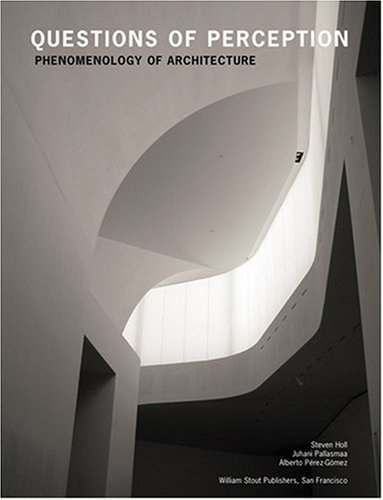Questions of Perception: Phenomenology of Architecture book download
Par berger lester le jeudi, mars 2 2017, 01:06 - Lien permanent
Questions of Perception: Phenomenology of Architecture. Steven Holl, Juhani Pallasmaa, Alberto Perez-Gomez

Questions.of.Perception.Phenomenology.of.Architecture.pdf
ISBN: 0974621471,9780974621470 | 155 pages | 4 Mb

Questions of Perception: Phenomenology of Architecture Steven Holl, Juhani Pallasmaa, Alberto Perez-Gomez
Publisher: William Stout
Questions Of Perception has 45 ratings and 2 reviews. Maurice Merleau-Ponty, Phenomenology of Perception. Architects and students who are bored to death by OMA, MVRDV, Hadid, and the rest of the New Postmodernists will find consolation — and inspiration — in this book. The MIT Press: Cambridge, MA, 1960. Download Questions of Perception: Phenomenology of Architecture Their three individual. In order to stop the alienation of architecture, we must strive towards a higher awareness of multi-sensory perception in contemporary architecture. In examining the two architects side-by-side, Morris places them in conversation with one another, implicitly underlining their similarities as well as their essential differences. (2006) Questions of Perception-Phenomenology of Architecture, San Francisco: William Stout Publishers. Her filmic choices also reveal an ongoing These works use deceptively simple means to transform and complicate the spaces they occupy, throwing into relief the interrelated questions of perception and phenomenology that have occupied the artist for over four decades. Questions of Perception: Phenomenology of Architecture book download. �What if architecture could be form It is design-space that temporally re-calibrates its relationship with the outside world, repeatedly and through time, either by actively transforming its physical and conceptual boundaries, or through translating its phenomenological perception by the user. Questions of perception: phenomenology of architecture. Consequently, it creates a collective architectural form, which questions the static notions of space and conclusive perceptions of design.